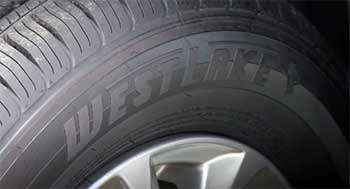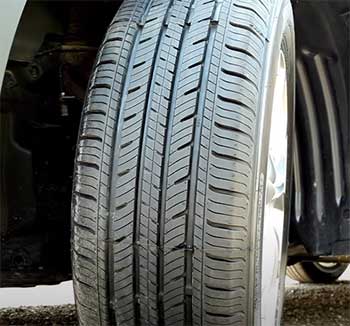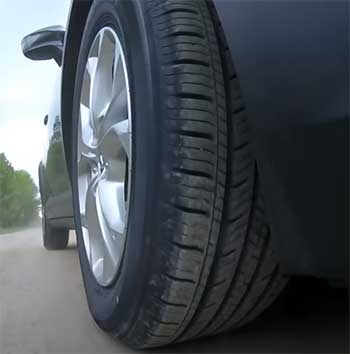Westlake tires have become a popular budget tire brand in recent years. Known for their low cost, Westlake tires seem like an attractive option for drivers looking to save money on replacements.
However, many consumers have found that these inexpensive tires come with some significant downsides.
In this article, we’ll take an in-depth look at some of the most common problems reported with Westlake tires. We’ll examine the typical complaints about tread life, performance, and quality issues.
Keep reading to learn more about the drawbacks of these budget-friendly tires.
Common Problems With Westlake Tires
- Short Treadwear and Premature Replacement

One of the most frequent grievances with Westlake tires is their exceptionally short tread life.
Many owners report that their Westlake tires wore out extremely quickly, often needing replacement with as little as 20,000-30,000 miles.
Compared to premium tire brands that normally last 45,000-60,000 miles, Westlake tires can wear out nearly twice as fast.
This means you’ll be buying new tires again much sooner, erasing any money you initially saved.
The rapid treadwear appears related to the cheap, hard rubber compounds used in Westlake tires. This material simply cannot withstand the friction and heat of everyday driving conditions over the long haul.
Excessively fast treadwear is frustrating and inconvenient for consumers, who expect longer mileage from their tire investment. With Westlakes, you may find yourself replacing tires every 2-3 years instead of the typical 4-6 years with long-wearing brands.
Also Read: Differences Between Bridgestone Blizzak LT And DM-V2 Tires.
- Poor Wet Traction and Handling
In addition to rapid treadwear, many drivers report disappointing wet weather performance from Westlake tires. Owners describe these tires as downright treacherous in heavy rain, with very poor hydroplaning resistance and handling.
The inadequate water evacuation tread design allows water to quickly build up under the tires. This results in a total loss of grip as the tires skim across the surface instead of maintaining road contact. Hard cornering and braking become sketchy, with a high risk of sliding and spin outs.
Even in light rain, the tires struggle to find traction and tend to feel loose and unstable. For drivers in areas with frequent wet conditions, the poor rain performance of Westlake tires makes them a very risky choice. Improper wet handling can lead to dangerous hydroplaning accidents.
- Insufficient Snow and Ice Traction

Beyond wet roads, Westlake tires also receive harsh criticism for their lackluster snow and ice traction.
Most Westlake tires do not feature an aggressive winter tread design with deep, biting edges.
As a result, owners report miserable performance trying to accelerate, corner, or brake on snowy and icy surfaces.
The tires continuously slip and slide, unable to get a firm grip even at low speeds. Hard packed snow and icy patches become impassible without chains.
In cold weather climates, the insufficient snow/ice traction of Westlake tires makes winter driving frightening and hazardous.
These are not tires you want to rely on when snowstorms hit. Even modest snowfall can become a major challenge.
- Quality Control Issues and Premature Failures
Another prevalent complaint about Westlake tires is their higher-than-average rate of defects and premature failures. From tread separation issues to sidewall bubbles, these tires seem prone to developing major problems before they should.
In some cases, Westlake tires have experienced catastrophic failures at extremely low mileage. Tread separation and blow outs can occur suddenly, causing dangerous flat tires without warning.
These quality control problems point to issues in the manufacturing process. In an effort to keep costs down, it appears Westlake does not maintain the same strict quality standards as major brands. The result is a tire more likely to suffer a premature breakdown.
- Poor Ride Comfort and Noise

Beyond performance and durability complaints, many Westlake owners also report a rough, unpleasant ride quality from these budget tires.
The stiff construction and lack of noise dampening features create noticeable cabin noise and vibration.
The tires transmit road irregularities directly into the cabin for a harsh ride.
You’re also likely to hear persistent droning from the large tread blocks on the highway.
Overall, the tires do not dampen sound or impacts nearly as effectively as premium brands.
The better comfort and quietness of big name tires is worth the extra cost for many drivers.
But with Westlake, you’ll have to tolerate a noisier, rougher ride to save money upfront.
- Weak Warranty Coverage
Considering the serious problems reported by consumers, Westlake’s warranty coverage provides little reassurance or protection. The treadwear warranty is capped at just 30,000 miles for most models, matching the tires’ disappointingly short lifespan.
Workmanship and materials defects are covered for only 2-3 years. Compared to 5-6 year warranties from top brands, Westlake’s warranty terms are very limited. And given the frequent complaints about premature failures, the short coverage period is concerning.
In the end, Westlake’s warranty simply doesn’t provide much confidence in the reliability or longevity of these budget tires. Make sure you understand the restrictions before assuming you’re protected down the road.
Are Westlake Tires a Good Value Overall?
Given all the potential drawbacks, are Westlake tires actually a smart budget choice that saves you money in the long run? Or does the poor performance and durability negate any upfront savings?
Here’s an honest look at whether these ultra-cheap tires truly deliver good value:
The Good
- Very low initial purchase price
- Can save $50+ per tire over major brands
- Decent dry handling when new
The Bad
- Exceptionally short tread life, needing replacement 2x as often
- Dangerously poor wet and winter traction
- Higher than average defects and failures
- Harsh ride quality and loud noise
- Weak warranty protections
Also Read: Issues TreadWright Tires.
5 Better Tire Brands Than Westlake
Instead of taking a chance on questionable Westlake tires, drivers should consider these 5 alternative budget-friendly brands that offer better performance, durability, and value:
1. General Tire
General Tire has a long history dating back over 100 years. They offer a full range of passenger, truck, and SUV tires priced very competitively with Westlake.
Key benefits:
- Very good dry and wet traction from quality tread compounds
- Durable construction with industry-average 45,000 mile treadwear
- All-season and winter tire options available
- 5 year limited warranty coverage
While not cheap, General Tire provides reliable performance at an affordable price point for most drivers. They’re a great value brand.
2. Cooper Tires
Founded in 1914, Cooper is another century-old American tire manufacturer known for their focus on safety and affordability.
Key benefits:
- Strong wet weather handling and traction
- Long 65,000+ mile treadwear warranties on many models
- Quiet ride quality and low noise levels
- Honest pricing that fits most budgets
Cooper delivers very good real-world value by emphasizing reliability, durability, and comfort without the premium markup.
3. Firestone Tires
Produced by industry giant Bridgestone, Firestone offers comparable quality and prices to Westlake tires.
Key benefits:
- All-season and winter tires options with strong traction
- 50,000+ mile treadwear warranties on numerous models
- Broad range of sizes for most vehicles
- Established name with century of experience
Backed by Bridgestone’s advanced R&D and manufacturing, Firestone tires present a solid mid-range value.
4. Nexen Tires
Founded in Korea in 1942, Nexen has rapidly expanded as a global tire OEM supplier and aftermarket brand.
Key benefits:
- Excellent traction and braking in dry and wet conditions
- Softer rubber compounds improve ride quality
- Up to 80,000 mile treadwear coverage available
- Affordable pricing for most drivers
Nexen offers advanced technology and materials for a very competitive cost. They’re a great bang-for-your-buck alternative to Westlake.
5. Kumho Tires
Kumho is another leading Korean tire manufacturer in the same league as Westlake for pricing.
Key benefits:
- Sharp handling, braking, and traction in dry and wet
- Low-rolling resistance for improved fuel economy
- 50,000 to 60,000 mile treadwear warranties
- Broad range of all-season, summer, and winter tires
Kumho delivers impressive performance stats and owner satisfaction ratings for an affordable price tag. They’re a smart buy over Westlake.
Overall, the low quality materials and construction mean you usually get what you pay for with Westlake tires. The value is there initially thanks to rock-bottom pricing. But premature replacement costs and risky performance make them less economical long-term.
Other budget-friendly brands like General Tire and Cooper offer a better combination of affordability and reliability. While paying more upfront for premium tires is ideal, Westlake tires cut too many corners on safety and longevity to recommend for most drivers.
Also Read: Issues With Coker Tires.
Frequently Asked Questions (FAQ)
Overall, Westlake tires tend to rate as “bad” due to common complaints about rapid treadwear, poor wet/winter traction, quality control issues, a rough ride, and minimal warranty protection. While the ultra-low pricing seems appealing, these tires fail to deliver reliable long-term performance and durability.
Among tire industry experts and consumers, Westlake tires consistently rank as a lower-tier budget brand. They rate below mid-range options from Cooper, General, and other value-focused companies. While they beat the cheapest no-name brands, Westlake trails far behind premium options from Michelin, Continental, Goodyear and other top manufacturers.
On average, most Westlake tire models last just 25,000-35,000 miles before needing replacement. Some owners report getting as little as 20,000 miles out of them. This falls well short of the 40,000-60,000 mile lifespan expected from mid-range to premium tire brands. The short life expectancy is the #1 complaint about Westlakes for good reason.
Without a doubt, the ultra-low prices are the main appeal of Westlake tires for most buyers. You can easily save $50+ per tire – sometimes as much as $100 per tire. Of course, that rock-bottom pricing comes from cheap materials and manufacturing shortcuts, which lead to the tires’ disappointing performance and durability down the road. But there’s no question Westlakes are cheap upfront.
Final Thoughts
So in summary, while Westlake tires offer short-term savings at purchase, their poor longevity, traction, ride comfort and unreliable quality make them a questionable value overall. Drivers are usually better off spending a little more for longer-lasting, safer tires from more reputable budget brands.
Or better yet, buying top-tier tires that justify their higher cost with many more trouble-free miles.

